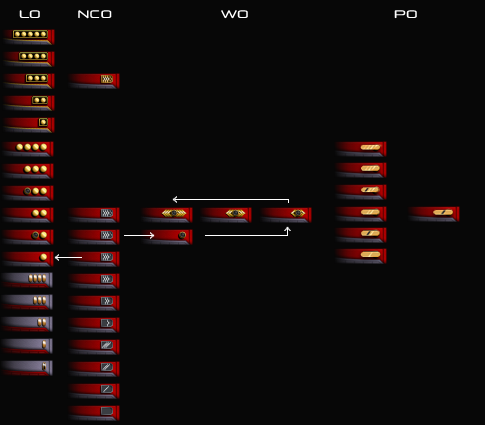Rank & Uniforms: Difference between revisions
From Star Trek: Theurgy Wiki
Auctor Lucan (talk | contribs) (→Rank) |
Auctor Lucan (talk | contribs) |
||
| Line 191: | Line 191: | ||
|} | |} | ||
==== Non-Commissioned Officers ==== | ==== Enlisted & Non-Commissioned Officers ==== | ||
{| border=0 cellspacing=1 style="background:#000" | {| border=0 cellspacing=1 style="background:#000" | ||
| Line 201: | Line 201: | ||
! style="background: #252525; color: white"|[[File:R-e9.png]] | ! style="background: #252525; color: white"|[[File:R-e9.png]] | ||
! style="background: #252525; color: white"|Master Chief Petty Officer | ! style="background: #252525; color: white"|Master Chief Petty Officer | ||
|rowspan=10 style="background: #252525; color: white;"|If you choose the Non-Commissioned Officer (NCO) path, | |rowspan=10 style="background: #252525; color: white;"|If you choose the Enlisted and later Non-Commissioned Officer (NCO) path, your character would have stayed in Starfleet Boot Camp for six months as a Crewman Recruit, learning the ropes in a more simple way than Commissioned Officers, with a course emphasis relevant to your division. Once making the rank of Chief Petty Officer, NCOs can transfer to Commissioned Officer status, and become an Ensign. So, NCOs are those who have not completed the four-year Starfleet Academy course or otherwise been given a commission as an officer through Officer Candidate School. In most cases, Enlisted crewmen sign up directly to a ship or posting, and receive basic training, as well as any specific courses required for their position. | ||
As with | As with Commissioned Officers, there is a rank structure amongst enlisted crew. In naval systems, these are referred to as "rates". In military systems these are called "grades". The term "Non-Commissioned Officer" refers specifically to any enlisted personnel given authority over other personnel. In Starfleet, this could refer to any Petty Officer (up to Master Chief). | ||
All | All Commissioned Officer ranks, from Ensign upward, outrank all Enlisted in the chain of command. However, in certain cases, Non-Commissioned officers can exercise authority over Commissioned Officers (Miles O'Brien is one such case, in his position as chief of operations aboard Deep Space 9). Additionally, Chief Petty Officers such as O'Brien wield influence far beyond their place in the rank structure due to their extensive experience and skill and are expected to mentor Junior Officers as well as other Non-Commissioned Oofficers. | ||
|- | |- | ||
! style="background: #252525; color: white"|[[File:R-e8.png ]] | ! style="background: #252525; color: white"|[[File:R-e8.png ]] | ||
Revision as of 19:30, 12 November 2016
Division Colors
Within Starfleet, there exists four divisions of personnel, which handle all possible allotted tasks.
Red indicated Command, Tactical and CONN. These were commanders, like COs and XOs, or administrative personnel, yeomen. They were also CONN and Flight Control officers. Tactical Officers also wore this colour, with the Chief Tactical Officer posted on the Bridge.
White indicated Tactical CONN. This was where the Starfleet Fighter Pilots and Officers belonged; in the newly formed Aerospace Command division where space aviation and military/tactical knowledge went hand in hand. The Tactical CONN department worked very closely with both the CONN and Tactical departments.
Gold indicated Engineering, Operations and Security. These were those who built, configured, alloted, and repaired ship's systems. Security handled security on board, ranging from crowd control, the Brig and a number of related issues.
Teal indicated Science, Medical and Counseling. These were the nurses, doctors, pharmacists, and orderlies of the Sickbay. They also analyse scientific data, and preform experiments.
Duty Uniforms
Like all ships of Starfleet, the USS Theurgy had a specific dress code for on-duty officers. As of 2380, the following was the USS Theurgy’s uniform code. The standard uniform worn by all crew while on duty aboard the Theurgy. The uniform was based off the last two seasons of DS9 with a few differences and additions. The standard duty uniform was a three piece ensemble consisting of pants, colored undershirt (department specific color), and jacket. An optional skirt was permitted for female crew if they wished.
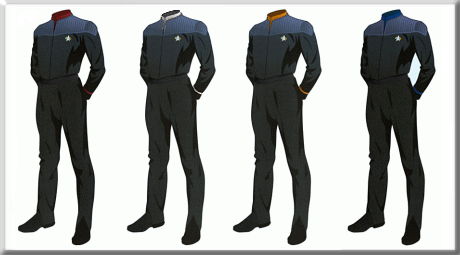
|
| Men's Duty Uniform |
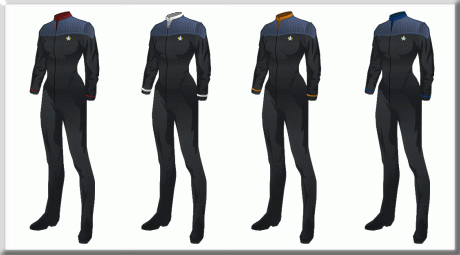
|
| Women's Duty Uniform |
| File:Uniforms female - skirt.png |
| Women's Duty Uniform w. Skirt |
Additional Uniforms
In addition to the standard uniform, several special purpose general duty uniforms existed. Civilian technical staff in the Engineering and Operations departments could wear a technician's jumpsuit as required by their job description.
Medical staff, regardless of rank, were permitted to wear a lab coat as required for their job. They also had surgical scrubs that they would wear during surgery. Counseling Staff, when not on bridge duty, could wear civilian clothing. When on bridge duty, Counseling staff are expected to wear the standard blue uniform of Medical/Sciences.
Tactical CONN personnel had an exosuit that functioned as a low-profile EVA suit. Their survivor mentality generated some off duty tendencies as well, like wearing matching flight jackets, necklaces, or hoodies that bolstered their team spirit. (See page Tactical CONN).
Cadet uniforms were similar in all respects to standard issue uniforms except that the uniform was a grey color with their departmental color worn on the uniform shoulders and a stripe around the wrist of the jacket. Cadets were normally expected wear the standard style uniform unless directed otherwise by their supervisor.
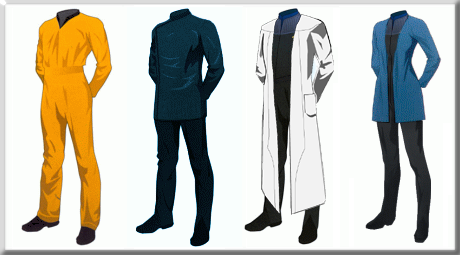
|
| Additional Uniforms |
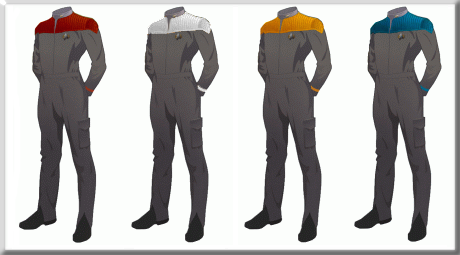
|
| Cadet Uniforms |
Exercise Uniforms
Starfleet has also developed a special purpose exercise uniform for use by crew while undergoing physical training or other strenuous physical activities. These are permitted to worn anytime a crew member is off duty, or is on duty and undergoing physical training. Outside of PT, this uniform is not to be worn while on duty.
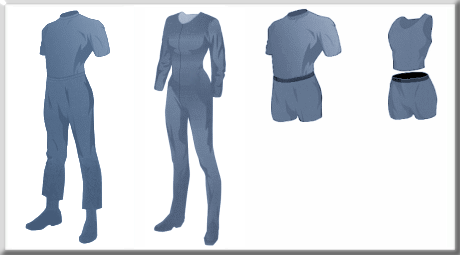
|
| Exercise Uniforms |
Dress Uniforms
Official functions both on and off-board ship was expected of Starfleet crew and special purpose formal attire had been developed for this. A formal jacket was designed to be worn in place of the duty jacket when in attendance at formal events. Enlisted personnel wore a special purpose grey formal uniform for such occasions. As with the duty uniforms, a skirt was allowed to be worn by female crew.
| File:Uniforms dress.png |
| Dress Uniforms |
Rank
The Starfleet ranking system was broken up into four, in this descending rank:
- Line Officers, including:
- Flag Officers
- Commissioned Officers
- Cadets
- Warrant Officers
- Non-Commissioned Officers, also called Enlisted
- Provisional Officers
Provisional officers, however, earned a field promotion aboard a ship or a starbase, and could even hold line officer rank. Aside from rank, all officers also held a position in a department, which could be said to be his or her 'job'.
Flag Officers
Commissioned Officers
| Insignia | Rank | Grade |
|---|---|---|
| Captain | A Commissioned Officer is an individual who has attended, and graduated from the cadet program of Starfleet Academy or has been commissioned through the Officer Candidate School after having attained their education in their field elsewhere. Those graduating from Starfleet Academy earn a four-year degree (Bachelor's) in their major field of study such as communications, engineering, the sciences, or nursing. After four years at the Academy, you either pass or fail. If passing, the player will be promoted to Ensign. Officers doing exceptionally will be promoted directly to Lieutenant Junior Grade.
Medical officers attend an additional four years at Starfleet Medical Academy before earning their medical degree (or earn their commission through Officer Candidate School after having obtained their degree elsewhere). | |
| Commander | ||
| Lieutenant Commander | ||
| Lieutenant | ||
| Lieutenant Junior Grade | ||
| Ensign |
Cadets
| Insignia | Rank | Grade |
|---|---|---|
| Cadet 4th year | Cadet was a rank which was used at Starfleet Academy to denote students in training to become Starfleet officers. Becoming a Starfleet cadet was a difficult process and required a significant amount of academic achievement while in high school. Academy entrance standards were particularly high, especially in scientific and math disciplines (such as calculus). Cadets were also expected to maintain a satisfactory grade point average during their attendance at the Academy. Getting bad grades was grounds for a cadet's revocation of appointment from the Academy, also known as "washing out". Starfleet cadets were under the same uniform code of justice as Starfleet officers and were in turn subordinate to the orders of superiors. They were also required to report violations of Federation law they observed to their superiors. Cadets were also expected to show military courtesy and respect to senior commanders. | |
| Cadet 3rd year | ||
| Cadet 2rd year | ||
| Cadet 1rd year |
Warrant Officers
Enlisted & Non-Commissioned Officers
Provisional Officers
Civillian Personnel
Not all members of the crew hold a Starfleet Rank, but may rather be civilian expertise in certain fields - filling functions of the ship where Starfleet training is not required. Examples are waitresses/waiters of the Ship Lounge (named Below Deck on the USS Theurgy), the Chef of the mess hall. Also, professors in certain scientific fields may not belong to the Science Department of Starfleet.
Chain of Command
Aboard the Theurgy, a specific Chain of Command is followed. Below you can find the command structure of the Starfleet of the United Federation of Planets. All ranks are followed by this leadership, with the commissioned officers taking the lead in the ranks in the first column.
Disclaimer
Uniform portions of this page is used with permission of USS Wolff CO - granted Nov 1, 2016
